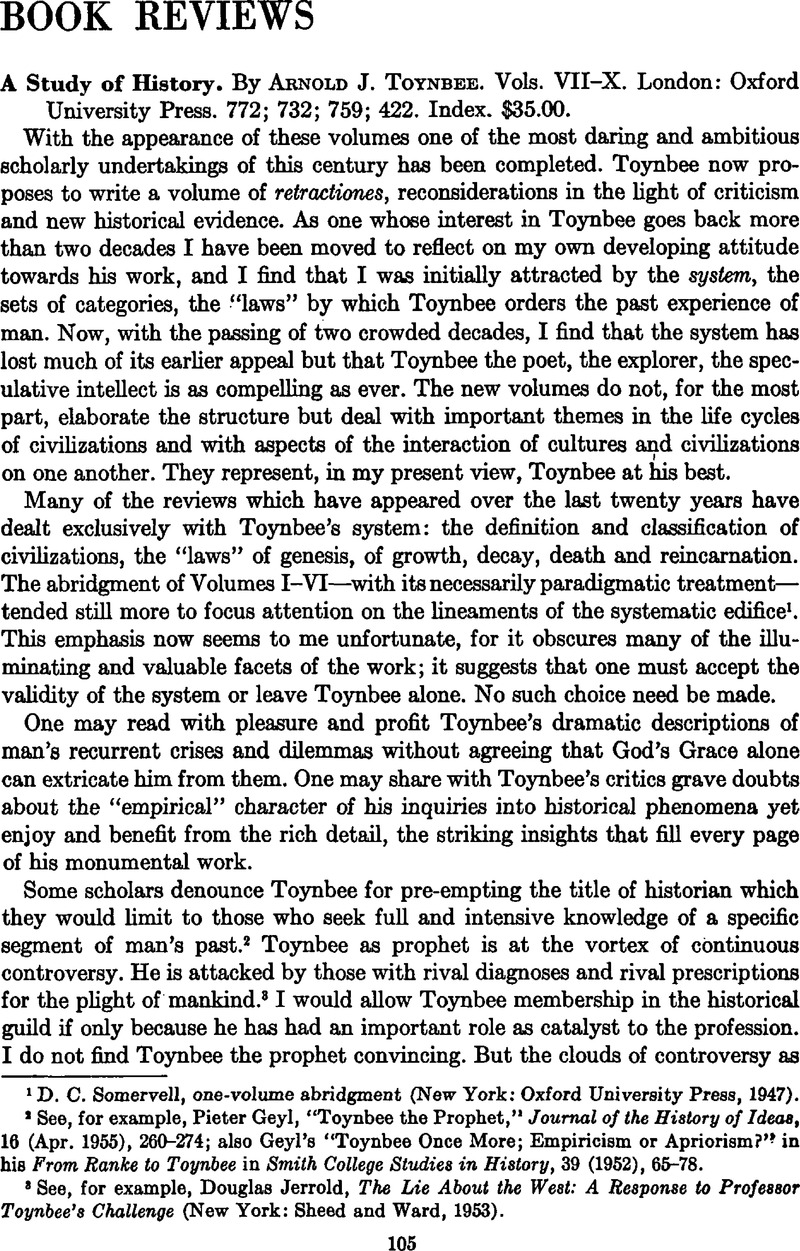No CrossRef data available.
Published online by Cambridge University Press: 23 March 2011

1 Somervell, D. C., one-volume abridgment (New York: Oxford University Press, 1947).Google Scholar
2 See, for example, Geyl, Pieter, “Toynbee the Prophet,” Journal of the History of Ideas, 16 (04 1955), 260–274CrossRefGoogle Scholar; also Geyl, 's “Toynbee Once More; Empiricism or Apriorism?” in his From Ranke to Toynbee in Smith College Studies in History, 39 (1952), 65–78.Google Scholar
3 See, for example, Jerrold, Douglas, The Lie About the West: A Response to Professor Toynbee's Challenge (New York: Sheed and Ward, 1953).Google Scholar
4 Cf. Cameron, Meribeth E., “A Bisection of Chinese History,” Pacific Historical Review, 8 (12 1939), 401–412CrossRefGoogle Scholar; Altree, Wayne, “Toynbee's Treatment of Chinese History,” Papers on China (mimeographed for private distribution by the Committee on International and Regional Studies, Harvard University, 1948), 2:1–54. Toynbee's analysis of Japanese civilization is one of the most unconvincing in the entire Study; a careful critique is badly needed.Google Scholar
5 Edward Fiess makes this point in “Toynbee as Poet,” Journal of the History of Ideas, 16 (04 1955), 278Google Scholar. It is to be hoped that this first essay in literary criticism of Toynbee will be followed by further studies.
6 A Study of History, 8: 623.Google Scholar
7 See Toynbee's essay “The feeling for the poetry in the facts of history,” 10:113–125.Google Scholar
8 Bielenstein, Hans, The Restoration of the Han Dynasty (Göteborg: Blander, 1953), 14–15.Google Scholar
9 The point is well made by Etienne Balázs in his review of Fang, Achilles, The Chronicle of the Three Kingdoms in Etudes Asiatiques, 3/4 (1953), 166–167.Google Scholar
10 A Study of History, 8: 680–623.Google Scholar
11 The discussion of Chinese Herodianism, 8:594–595, overemphasizes the role of Protestant missionaries and Western-educated Chinese; none of the leading “Herodians” of the nineteenth century in China were educated abroad or converted to Christianity; they were, rather, staunch Confucians committed to the borrowing of Western techniques for the defense of the order they cherished. Yet here, as elsewhere, I do not regard a serious misinterpretation as invalidating the whole analysis of a seemingly universal phenomenon.
12 A Study of History, 9: 1–166.Google Scholar
13 A Study of Hisiory, 7: 344–372.